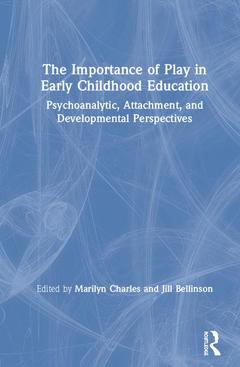Description
The Importance of Play in Early Childhood Education
Psychoanalytic, Attachment, and Developmental Perspectives
Coordinators: Charles Marilyn, Bellinson Jill
Language: English
Subjects for The Importance of Play in Early Childhood Education:
Keywords
Young Men; Play; Case Western Reserve University; psychoanalysis; Moving Dancing Group; education; Improve Play Skills; early years; ECCE Setting; developmental psychology; General Attachment Style; clinical psychology; Attention Deficit Hyperactivity Disorder; trauma; Kapa Haka; culture; Palliative Strategies; attachment theory; ECCE; Teddy Bear; Zealand Early Childhood Curriculum; Great Granddad; Elaborative Reminiscing; Children’s Socioemotional Development; ECMHC; Attachment Behavioral; Pretend Play; Tv Remote; Dad Died; Effective Early Childhood Teaching; ABC Task Force; Attachment Behavioral Patterns; Max Van Manen; Parent Child Conversations
Publication date: 06-2019
· 15.6x23.4 cm · Hardback
Publication date: 06-2019
· 15.6x23.4 cm · Paperback
Description
/li>Contents
/li>Readership
/li>Biography
/li>
The Importance of Play in Early Childhood Education presents various theories of play and demonstrates how it serves communicative, developmental, and relational functions, highlighting the importance and development of the capacity to play in terms useful to early childhood educators. The book explicitly links trauma, development, and interventions in the early childhood classroom specifically for teachers of young children, offering accessible information that can help teachers better understand the meanings of children?s expressive acts.
Contributors from education, psychoanalysis, and developmental psychology explore techniques of play, how cultural influences affect how children play, the effect of trauma on play, factors that interfere with the ability to play, and how to apply these ideas in the classroom. They also discuss the relevance of ideas about playfulness for teachers and other professionals.
The Imprtance of Play in Early Childhood Education will be of great interest to teachers, psychoanalysts, and psychotherapists as well as play therapists and developmental psychologists.
Introduction—Marilyn Charles THEORIES OF PLAY 1. Child Development through Play — Stephanie Creekpaum 2. Pretend Play in the Classroom: Helping Children Grow — Sandra W. Russ & Alexis W. Lee UNDERSTANDING PLAY 3. Play as Communication — Brenda Lovegrove Lepisto 4. From Reaction to Reflection: Mentalizating in Early Childhood Education — Norka MalbergPLAY IN THE CLASSROOM 5. Play in the Emotional and Cognitive Life of a Preschooler — Steve Tuber 6. Being a Playful Teacher — Peter Blake 7. Mine! No, MINE!! Interaction in Children’s Play — Jill Bellinson TECHNIQUES OF PLAY 8. Art-making Experiences for Young Children Affected by Traumatic Experiences — Ann-Marie Mott 9. Young Children’s Musicality: Relating with Rhythm — Sophie Alcock 10. Promoting Identity Development through Memory Narratives — Elaine Reese and Tia Neha SPECIALIZED NEEDS FOR PLAY 11. Trauma and Identity — Marilyn Charles 12. Working with Difficult and Hard to Understand Children — Ionas Sapountzis CULTURE AND PLAY 13. Creating Reflective Space in the Classroom – Ana Archangelo and Fabio Camargo Bandera Villela 14. Cultural Issues in Relation to Play for Teachers — Athena Drewes 15. Culture and Play as Key Elements of Identity Formation and Academic Performance for Children of Color in Primary Education — Kirkland C. Vaughans and Renee Vaughans TEACHERS AND PLAY 16. Engaging Children in Healing Work — Michael O’Loughlin 17. Teacher Stress: Impact, Challenges, and Solutions — Deborah Mugno and Jennifer Reid Afterword —Jill Bellinson
Marilyn Charles, Ph.D., ABPP, is a psychologist and psychoanalyst at the Austen Riggs Center, and Professor, University of Monterrey (UDEM), with a special interest in the intergenerational transmission of trauma. Recent books include Psychoanalysis and Literature: The Stories We Live, Working with Trauma, and Introduction to Contemporary Psychoanalysis.
Jill Bellinson, Ph.D., is a psychologist and psychoanalyst in New York City, USA. She has served as psychological consultant to preschools and child welfare agencies for more than 30 years and is author of Children’s Use of Board Games in Psychotherapy and numerous papers on psychodynamic treatment of children and adults.




